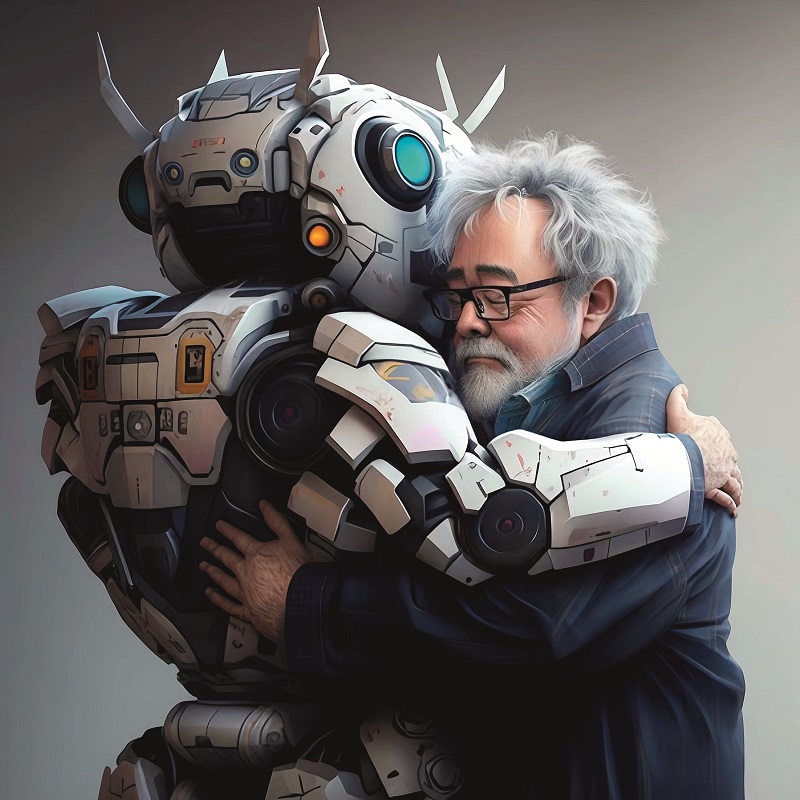Becoming an AI Super Expert?

Recent times have brought remarkable advancements in artificial intelligence-generated content (AIGC) technology. Among them, the explosive emergence of ChatGPT lifted humanity into a new era. It is regarded by many as a technological revolution in artificial intelligence (AI), natural language processing (NLP), and machine learning. ChatGPT’s logical capabilities are equivalent to those of an undergraduate student, with a knowledge base that approaches omniscience, and its computational power is astonishing. And its evolution is rapid. AIGC has also created remarkable works of film, music, and literature, including AI-directed Zone 414, AI-composed The Infinite Album, and an AI-poet’s The GPT-3 Poetry Collection. Moreover, AIGC is now providing efficient and intelligent services in fields such as education, healthcare, and law through products like the AI mobile learning program Socratic, the AI doctor app Ada Health, and the AI chatbot lawyer DoNotPay.

Meanwhile, several tech giants are doubling down on their investment in the metaverse despite losses in some sectors. Meta, for example, has demonstrated its unwavering commitment to the metaverse, while Apple is poised to release a high-end XR device later this year. Gaming companies like Nvidia, Epic Games, Roblox, and Unity are also driving innovation and development in the metaverse.
Advancements in 5G networks, computing power, artificial intelligence, game engines, display technology, and blockchain are constantly improving the technological foundation of the metaverse. The metaverse’s application scenarios are expanding, with emerging experiences such as online concerts, virtual try-ons, and digital art. The value chain of the metaverse is gradually taking shape in various aspects including experience, discovery, the creator economy, spatial computing, decentralization, human-machine interaction, and infrastructure.
With the rapid development of science and technology, significant changes have taken place in lifestyles, social structures, and economic models. The question of whether we can adapt to these changes has become increasingly important. Despite these changes, humans need not to worry much. Thus far, AIGC cannot fully replace humans in many ways. For example, AI lacks the ability to fully comprehend human emotions, sense of value, and cultural backgrounds. It cannot ensure the authenticity and credibility of the content generated, which may result in offering misleading or deceptive information. Additionally, it cannot produce completely original and unique content, potentially leading to copyright infringement or plagiarism. It also struggles to adapt to complex and ever-changing needs and scenarios, which may result in logical errors or inconsistencies.
Every imaginable scenario demands human intervention. The rapid advancement of AIGC has generated an enormous demand for AI engineers, trainers, coaches, and super experts. When individuals acquire skills in multi-domain or all-domain intellectual labor through AI technologies like ChatGPT, they can be considered super experts with intelligence and skills far beyond a single person. These super experts can leverage AI tools to enhance their creativity, abilities to solve problems and make decisions, and critical thinking. As a result, they can better adapt to rapidly evolving environments and market demands. They are not just consumers of AI, but also designers, developers, and trainers of it. They understand the potential and limitations of AI technology and can fully utilize it to create value and solve problems while identifying and addressing potential problems and risks. Such super experts can accomplish many things through AI technology. For instance, they can enhance their own language expression skills using ChatGPT, tackle various problems related to technology, business, and society with the help of AI tools, conduct data analysis and prediction to make informed decisions, and create better content in the form of video, audio, and images. As AI technology continues to advance and spread, those super experts will play an increasingly significant role in shaping the future of society and the economy.
The rapid development of technology is expected to bring significant changes to our lifestyles, social structures, and economic models. To quickly adapt to the current era, we need to keep learning and updating our knowledge while also improving our confidence and recognition of our abilities. We should cultivate innovative thinking, strengthen our social skills, establish appropriate social networks, and seek support and resources whenever necessary. It’s also important to maintain a healthy and balanced lifestyle, learn how to manage stress and anxiety, and avoid negative influences that can undermine self-efficacy. By embracing the future with the support of technology, people can set themselves up for success in the years to come.
This article was written and translated with the assistance of the AI platform ChatGPT.